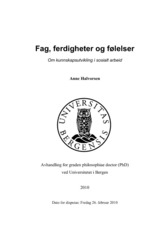Fag, ferdigheter og følelser. Om kunnskapsutvikling i sosialt arbeid
Doctoral thesis
Permanent lenke
https://hdl.handle.net/1956/3858Utgivelsesdato
2010-02-26Metadata
Vis full innførselSamlinger
- Department of Sociology [429]
Sammendrag
The theme of this dissertation is knowledge and knowledge developmentextrapolating from case studies in social work. The dissertation is based on my workwith two collaborative research and development projects, one in child protection andone in social work more generally. I contributed to these projects over a period of sixyears from 2002 onwards, partly as project leader/coordinator and partly asresearcher. The projects consisted of several local development projects where avariety of evaluation and knowledge creation methods were tested in collaborationbetween practitioners and researchers. During the project period, I collected data inseveral forms, including: personal interviews with former child protection clients, asurvey among practitioners who took part in local development projects, focus groupinterviews, notes and tapes from relevant meetings, conversations, and work-shops.The dissertation consists of four articles published over a period from 2004 to 2009.My research interest in connection with the projects has been to study howpractitioners in the field related to and made use of different forms of knowledge,research included, how they defined their knowledge needs and, more specifically,how they understood the relationship between research and practice. The specificresearch questions discussed in the dissertation are:- What are the characteristics of social work practice?- What conceptions of knowledge exist in research and in practice, exemplifiedby the discussion about evidence-based practice?- How can we understand the relationship between research and practice?- What role could practice and practitioners play in research and knowledgedevelopment?The research questions were, however, not defined beforehand, or even in the firstperiod of the project. They are more the result of an interest that emerged from collaboration with practitioners and of learning about social work as an example of afield of social practice, with some peculiarities. The stakes involved, both for theindividual client and for society at large, are high; they concern the fulfillment ofindividual potential and the strengthening of society. At the same time, theknowledge base of social work is described as weak and there is a concern thatresearch could and should play a far more influential role in practice than it seems todo at the moment.During the past ten to fifteen years, there has been a debate going on in the field ofsocial work about "what works" and about the need for evidence based practice(EBP). The debate sharpened my interest in how the agents in the social work field,both the practitioners and the users, understood and related to questions about whatworks, what knowledge means and does, and how research can inform practice.In the first article, different approaches to evaluation, such as participatory evaluationand evaluation as an integral part of practice, are discussed. The purpose of the articleis to present some alternatives to the seemingly predominant understanding ofevaluation as a method of control and measuring effects.The second article makes a more nuanced argument for the need to integrate oranchor evaluation in practice. This is evaluation aimed at organizational learning andbetter practice, and involves the development of evaluation tools and routines incollaboration between research and practice.The third article is based an exploratory study. A small group of former childprotection clients were interviewed about their childhood experiences and how theysaw their present situation in the light of their experiences as children "under care".The purpose of the study was to learn what they thought about the consequences orresults of "being under care". The article is a contribution to the debate concerningwhat counts as evidence and evidence-based research.In the fourth article, practitioner research is defined and its pros and cons discussed.The discussion is based on data from a survey of practitioners where they were asked about their use of a variety of knowledge sources ranging from their own andcolleagues' personal experiences to research.On the basis of these four articles, I discuss how different forms of knowledge caninform social work practice. A provisional conclusion is that research can be mademore accessible and relevant to practice through closer collaboration with practice.As a consequence of this cooperation, researchers will gain access to a broader basefor theory development. Another preliminary conclusion is that the likelihood ofobtaining high-quality knowledge-based practice in social work increases whenpractitioners engage directly in R&D projects, use established theory, and when theyuse available research and working methods based on scientific principles as basis foranalysing and improving their own practice. That said, within the social sciencesthere is a wide range of approaches and methodologies. When mixed they canreveal/unveil different layers of reality, and in that way better capture the complexityof social work practice.
Består av
Paper I: Nordisk sosialt arbeid 24(4), Halvorsen, A., Evaluering av sosialt arbeid - mer enn måling og kontroll, pp. 356-368. Copyright 2004 Universitetsforlaget. Full text not available in BORA due to publisher restrictions.Paper II: Nordisk sosialt arbeid 27(3), Halvorsen, A., Praksisforankret evaluering i sosialt arbeid: - hva er det og hvorfor skal en drive med det?, pp. 204-214. Copyright 2007 Universitetsforlaget. Full text not available in BORA due to publisher restrictions.
Paper III: Qualitative Social Work 8(1), Halvorsen, A., What Counts in Child Protection and Welfare?, pp. 65-81. Copyright 2009 Sage Publications. Full text not available in BORA due to publisher restrictions. The published version is available at: http://dx.doi.org/10.1177/1473325008100422
Paper IV: Halvorsen, A., 2009, Praktikerforskning - legitimt og nyttig bidrag i kunnskapsutvikling, pp. 109-129. In: Garmann Johnsen, H. C.; Halvorsen, A.; Repstad, P. (red.), Å forske blant sine egne. Universitetet og regionen - nærhet og uavhengighet. Published by Høgskoleforlaget. Full text not available in BORA due to publisher restrictions.
Utgiver
The University of BergenOpphavsrett
Anne HalvorsenAll rights reserved
